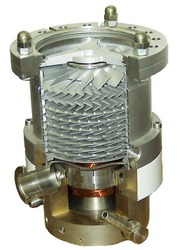Turbomolecular Pumps Market Size, Industry Share, Growth & Forecast 2024-2028

Strong 8k brings an ultra-HD IPTV experience to your living room and your pocket.
Global Turbomolecular Pumps Market Overview 2024-2028
IMARC Group, a leading market research company, has recently releases report titled “Turbomolecular pumps Market: Global Industry Trends, Share, Size, Growth, Opportunity and Forecast 2024-2028.” The study provides a detailed analysis of the industry, including the global Turbomolecular pumps market share, size, trends and growth forecasts. The report also includes competitor and regional analysis and highlights the latest advancements in the market.
Turbomolecular pumps represent the pinnacle of cutting-edge technology, purpose-built to establish high-vacuum environments in industrial settings. Utilizing swiftly rotating blades, these advanced pumps excel at swiftly and effectively extracting gas molecules from vacuum chambers, resulting in an exceptionally pure and potent vacuum. The impact of these pumps on the industrial vacuum sector is profound, ushering in a new era of cleanliness and precision in various fields. Industries such as semiconductor manufacturing, research laboratories, aerospace, and other high-tech sectors heavily rely on these pumps as an indispensable component. By maintaining ultra-clean, contaminant-free environments, these pumps ensure optimal performance and uncompromised product quality, making them a driving force behind technological advancement.
The global turbomolecular pumps market size reached US$ 1.3 Billion in 2022. Looking forward, IMARC Group expects the market to reach US$ 1.9 Billion by 2028, exhibiting a growth rate (CAGR) of 6.28% during 2024-2028.
Global Turbomolecular Pumps Market Trends and Drivers:
Currently, the semiconductor manufacturing sector is thriving and serves as a significant driving force for market growth of turbomolecular pumps. These pumps are crucial in creating high vacuum conditions during the fabrication of microchips and other electronic components, meeting the escalating demand for precision and cleanliness brought on by advancing semiconductor technologies. Furthermore, turbomolecular pumps play a vital role in aerospace applications, providing essential vacuum conditions for testing and manufacturing critical components like propulsion systems and satellite parts. With the aerospace sector experiencing advancements in space exploration and satellite technology, the global demand for turbomolecular pumps continues to rise.
Global Turbomolecular Pumps Market 2024-2028 Analysis and Segmentation:
Top Key Players covered in this report are: Agilent Technologies Inc., Atlas Copco, Busch LLC, Ebara Corporation, Elettrorava S.r.l., FMG Enterprises Inc., Ingersoll Rand Inc., KYKY Technology Co. Ltd., Osaka Vacuum Ltd., Shimadzu Corporation and ULVAC Inc.
The report segmented the market on the basis of region, product and application.
Breakup by Product:
Magnetically Levitated
Oil Lubricated
Hybrid
Breakup by Application:
Analytical Instrumentation
Semiconductor
Research and Development (R&D)
Others
Breakup by Region:
North America
United States
Canada
Asia-Pacific
China
Japan
India
South Korea
Australia
Indonesia
Others
Europe
Germany
France
United Kingdom
Italy
Spain
Russia
Others
Latin America
Brazil
Mexico
Others
Middle East and Africa
Key highlights of the report:
Market Performance (2017-2022)
Market Outlook (2024- 2028)
Porter’s Five Forces Analysis
Market Drivers and Success Factors
SWOT Analysis
Value Chain
Comprehensive Mapping of the Competitive Landscape
If you need specific information that is not currently within the scope of the report, we can provide it to you as a part of the customization.
1 Preface
2 Scope and Methodology
2.1 Objectives of the Study
2.2 Stakeholders
2.3 Data Sources
2.3.1 Primary Sources
2.3.2 Secondary Sources
2.4 Market Estimation
2.4.1 Bottom-Up Approach
2.4.2 Top-Down Approach
2.5 Forecasting Methodology
3 Executive Summary
4 Introduction
4.1 Overview
4.2 Key Industry Trends
5 Global Turbomolecular Pumps Market
5.1 Market Overview
5.2 Market Performance
5.3 Impact of COVID-19
5.4 Market Forecast
6 Market Breakup by Product
6.1 Magnetically Levitated
6.1.1 Market Trends
6.1.2 Market Forecast
6.2 Oil Lubricated
6.2.1 Market Trends
6.2.2 Market Forecast
6.3 Hybrid
6.3.1 Market Trends
6.3.2 Market Forecast
7 Market Breakup by Application
7.1 Analytical Instrumentation
7.1.1 Market Trends
7.1.2 Market Forecast
7.2 Semiconductor
7.2.1 Market Trends
7.2.2 Market Forecast
7.3 Research and Development (R&D)
7.3.1 Market Trends
7.3.2 Market Forecast
7.4 Others
7.4.1 Market Trends
7.4.2 Market Forecast
8 Market Breakup by Region
8.1 North America
8.1.1 United States
8.1.1.1 Market Trends
8.1.1.2 Market Forecast
8.1.2 Canada
8.1.2.1 Market Trends
8.1.2.2 Market Forecast
8.2 Asia-Pacific
8.2.1 China
8.2.1.1 Market Trends
8.2.1.2 Market Forecast
8.2.2 Japan
8.2.2.1 Market Trends
8.2.2.2 Market Forecast
8.2.3 India
8.2.3.1 Market Trends
8.2.3.2 Market Forecast
8.2.4 South Korea
8.2.4.1 Market Trends
8.2.4.2 Market Forecast
8.2.5 Australia
8.2.5.1 Market Trends
8.2.5.2 Market Forecast
8.2.6 Indonesia
8.2.6.1 Market Trends
8.2.6.2 Market Forecast
8.2.7 Others
8.2.7.1 Market Trends
8.2.7.2 Market Forecast
8.3 Europe
8.3.1 Germany
8.3.1.1 Market Trends
8.3.1.2 Market Forecast
8.3.2 France
8.3.2.1 Market Trends
8.3.2.2 Market Forecast
8.3.3 United Kingdom
8.3.3.1 Market Trends
8.3.3.2 Market Forecast
8.3.4 Italy
8.3.4.1 Market Trends
8.3.4.2 Market Forecast
8.3.5 Spain
8.3.5.1 Market Trends
8.3.5.2 Market Forecast
8.3.6 Russia
8.3.6.1 Market Trends
8.3.6.2 Market Forecast
8.3.7 Others
8.3.7.1 Market Trends
8.3.7.2 Market Forecast
8.4 Latin America
8.4.1 Brazil
8.4.1.1 Market Trends
8.4.1.2 Market Forecast
8.4.2 Mexico
8.4.2.1 Market Trends
8.4.2.2 Market Forecast
8.4.3 Others
8.4.3.1 Market Trends
8.4.3.2 Market Forecast
8.5 Middle East and Africa
8.5.1 Market Trends
8.5.2 Market Breakup by Country
8.5.3 Market Forecast
9 SWOT Analysis
9.1 Overview
9.2 Strengths
9.3 Weaknesses
9.4 Opportunities
9.5 Threats
10 Value Chain Analysis
11 Porters Five Forces Analysis
11.1 Overview
11.2 Bargaining Power of Buyers
11.3 Bargaining Power of Suppliers
11.4 Degree of Competition
11.5 Threat of New Entrants
11.6 Threat of Substitutes
12 Price Analysis
13 Competitive Landscape
13.1 Market Structure
13.2 Key Players
13.3 Profiles of Key Players
13.3.1 Agilent Technologies Inc.
13.3.1.1 Company Overview
13.3.1.2 Product Portfolio
13.3.1.3 Financials
13.3.1.4 SWOT Analysis
13.3.2 Atlas Copco
13.3.2.1 Company Overview
13.3.2.2 Product Portfolio
13.3.2.3 Financials
13.3.2.4 SWOT Analysis
13.3.3 Busch LLC
13.3.3.1 Company Overview
13.3.3.2 Product Portfolio
13.3.4 Ebara Corporation
13.3.4.1 Company Overview
13.3.4.2 Product Portfolio
13.3.4.3 Financials
13.3.4.4 SWOT Analysis
13.3.5 Elettrorava S.r.l.
13.3.5.1 Company Overview
13.3.5.2 Product Portfolio
13.3.6 FMG Enterprises Inc.
13.3.6.1 Company Overview
13.3.6.2 Product Portfolio
13.3.7 Ingersoll Rand Inc.
13.3.7.1 Company Overview
13.3.7.2 Product Portfolio
13.3.7.3 Financials
13.3.7.4 SWOT Analysis
13.3.8 KYKY Technology Co. Ltd.
13.3.8.1 Company Overview
13.3.8.2 Product Portfolio
13.3.9 Osaka Vacuum Ltd.
13.3.9.1 Company Overview
13.3.9.2 Product Portfolio
13.3.10 Shimadzu Corporation
13.3.10.1 Company Overview
13.3.10.2 Product Portfolio
13.3.10.3 Financials
13.3.10.4 SWOT Analysis
13.3.11 ULVAC Inc.
13.3.11.1 Company Overview
13.3.11.2 Product Portfolio
13.3.11.3 Financials
Note: IndiBlogHub features both user-submitted and editorial content. We do not verify third-party contributions. Read our Disclaimer and Privacy Policyfor details.


